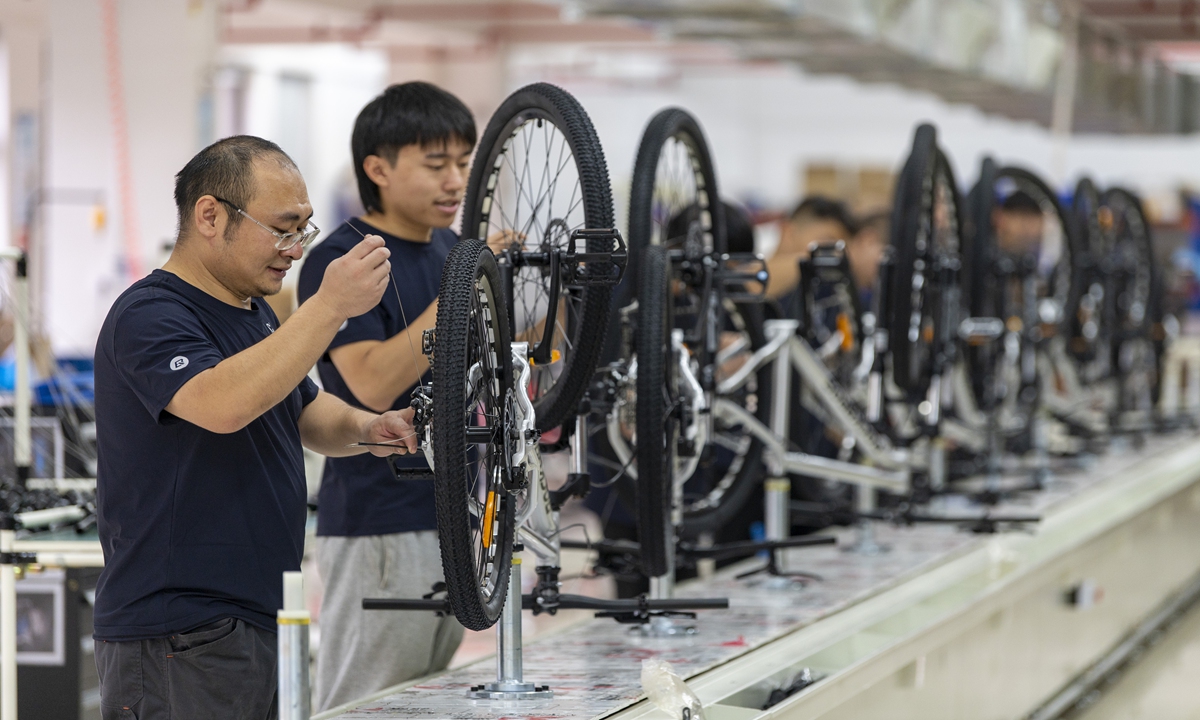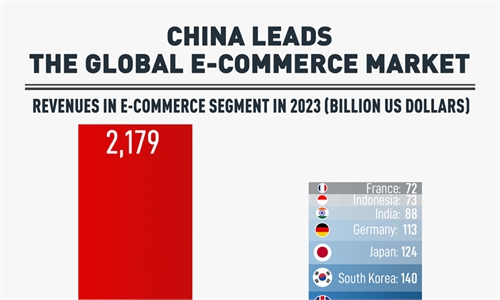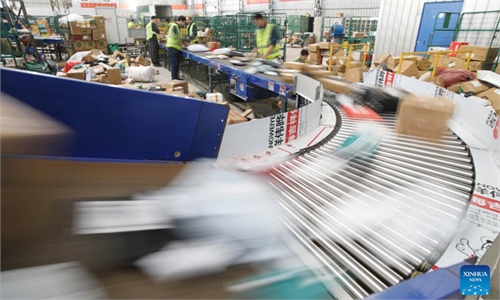Chinese firms gear up for Black Friday sales
Cost-effective products, live-streaming experiences contribute to global economy: experts

Workers at a sporting goods company in Yiwu, East China's Zhejiang Province assemble mountain bikes bound for overseas markets in the production line, on November 15, 2024, gearing up for the Christmas and Black Friday shopping sprees around the world.
Chinese enterprises, from e-commerce platforms, and logistics companies to live-streaming agencies, are gearing up for the holiday shopping sprees, including stepped-up marketing deployment such as focusing on livestreaming as well as beefing up production and logistics efficiency, as this year's Black Friday sales kick off.Cross-border e-commerce platform AliExpress has partnered with more than 1,000 content creators in the US for its corresponding campaign, the company told the Global Times on Sunday.
Yowant, a Chinese company dedicated to social e-commerce, has collaborated with more than 10 leading influencers in the UK and US, with over 20 live-streaming sessions scheduled during the Black Friday sales, with the gross merchandise value for the major livestreaming sessions targeting North America expected to surpass $1 million, domestic news outlet Yicai reported, citing Jiang Sheng, who is in charge of the company's overseas strategy.
Some of the foreign influencers are even planning to come to China to carry out live-streaming, with an offline selection base of nearly 2,000 square meters set up in Los Angeles for product selection and live-streaming, Jiang noted.
Strategies formed in the Chinese market such as live-streaming and low-price strategies can be applied to countries and regions across the globe, as the consumer demand and algorithms are similar, Liu Dingding, a veteran industry observer, told the Global Times on Sunday, adding that the growing momentum from Chinese firms will also offer more opportunities for international development.
Zhang Yi, CEO of the iiMedia Research Institute, told the Global Times on Sunday that the live-streaming model developed through the fierce competition in the Chinese market can be shared with more overseas operators.
Meanwhile, domestic manufacturers, logistics companies, and localities have been ramping up production while implementing supportive measures to facilitate timely deliveries.
A representative from a logistics park in Nansha district in Guangzhou, South China's Guangdong Province said that the park has gone through a relatively long preparation time with a growing number of commodities for the Black Friday sales to the US and EU, and has brought in hundreds of extra employees to deal with the peak shipments, CCTV reported.
In addition to clothing items and small commodities, furniture has also become a popular category for overseas consumption, with a domestic firm storing millions of items in stock in their overseas warehouses to meet the demand, per the CCTV report.
The local tax authorities in Yiwu, East China's Zhejiang Province - the global epicenter of small commodity production - have speeded up the efficiency of export tax rebate services and reduced the average processing time for export tax rebates to less than three working days, according to local news portal jhnews.com.cn.
China's strengths in the supply chain of the manufacturing sector are a prominent driver propelling the strong momentum for domestic firms going overseas, and there is a major advantage for cost-effective products, said Pan Helin, a member of the Expert Committee for the Information and Communication Economy under the Ministry of Industry and Information Technology.
Pan told the Global Times on Sunday that Made-in-China products and logistics services have contributed to ensuring the stability of the global supply chain while stressing the importance of domestic brands shifting from its scale advantage to the high-quality development of brand building and technological advancements.
The construction of overseas smart logistics platforms and cross-border e-commerce service platforms will continue to be promoted while overseas legal and tax resources and other services will be provided for enterprises, China's Ministry of Commerce announced on Thursday, as part of a broader set of initiatives to support the stable growth of foreign trade.


